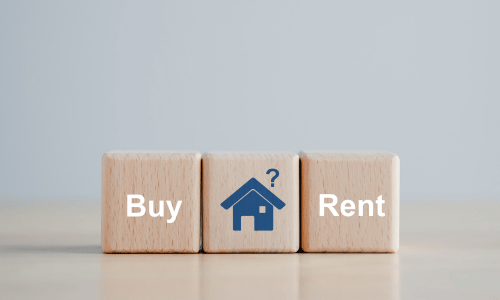Choosing between buying vs renting is an important decision. Owning a home provides stability and equity, while renting offers flexibility and fewer responsibilities. The right choice depends on your finances, lifestyle, and future goals.
This guide explains the key differences, helping you decide which option suits you best.
1. Financial Considerations
Costs of Buying a Home
Buying a home involves several expenses:
- Down Payment – Typically 10-20% of the home price.
- Closing Costs – Fees for loans, inspections, and legal paperwork (2-5% of the home’s value).
- Monthly Mortgage Payments – Includes principal, interest, property taxes, and homeowners insurance.
- Maintenance Costs – Repairs, upgrades, and general upkeep.
Costs of Renting
Renting has fewer financial commitments:
- Security Deposit – Usually one or two months’ rent.
- Monthly Rent – Paid to the landlord, sometimes covering utilities.
- Renter’s Insurance – Typically lower than homeowners insurance.
Summary: Buying requires more upfront investment but builds equity, while renting is more affordable in the short term.
2. Building Equity vs Paying Rent
How Buying Builds Wealth
Mortgage payments help you build equity, increasing your net worth. Over time, property values may rise, adding to your investment.
Why Renting Doesn’t Build Equity
Rent payments go to the landlord, offering no financial return. Your housing costs may also increase with market changes.
Summary: Buying helps you grow wealth, while renting provides no long-term financial gain.
3. Flexibility vs Stability
Advantages of Renting
- Easier to relocate for work or lifestyle changes.
- No long-term commitment to one property.
- Avoids risks of property value drops.
Advantages of Buying
- No rent increases from landlords.
- Freedom to personalise and modify your home.
- Provides long-term security.
Summary: Renting suits those who need flexibility, while buying offers long-term stability.
4. Responsibilities and Maintenance
Homeowner Responsibilities
- Regular maintenance and repairs.
- Property taxes and insurance payments.
- Managing unexpected home expenses.
Renter Responsibilities
- Most maintenance handled by the landlord.
- Fewer financial responsibilities.
- No property tax payments.
Summary: Homeowners have more responsibilities, while renters enjoy a hassle-free lifestyle.

5. Market Conditions and Timing
When Buying Makes Sense
- When mortgage rates are low.
- If home prices are expected to rise.
- When planning to stay in one place long-term.
When Renting is Better
- If home prices are too high.
- When mortgage rates are unaffordable.
- If you’re unsure about long-term plans.
Summary: Market conditions affect whether buying or renting is a smarter choice.
6. Lifestyle and Future Goals
Buying is Ideal If You Want:
- A permanent place to live.
- A financial investment.
- More space and privacy.
Renting is Ideal If You Want:
- Flexibility to move as needed.
- Lower upfront costs.
- Fewer maintenance responsibilities.
Summary: Your personal goals determine whether renting or buying is the right choice.
Conclusion: Which One is Right for You?
Your decision between buying vs renting depends on finances, lifestyle, and future plans.
- Buy a home if you want long-term stability and equity.
- Rent if you prefer flexibility and lower costs.
Consider your budget, goals, and the real estate market before making a decision. Consulting a real estate expert can also help you make the right choice.
Read more 7 Mistakes to Avoid When Selling Your Home
FAQ’s
Not always. Buying builds equity, but renting offers flexibility and lower upfront costs, depending on your financial situation and goals.
Renting doesn’t build equity, but on-time rent payments can improve your credit if reported to credit bureaus.
Save at least 10-20% for a down payment, plus closing costs, emergency funds, and future home maintenance expenses.






